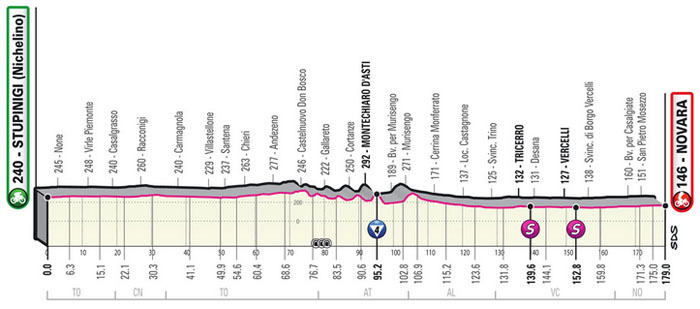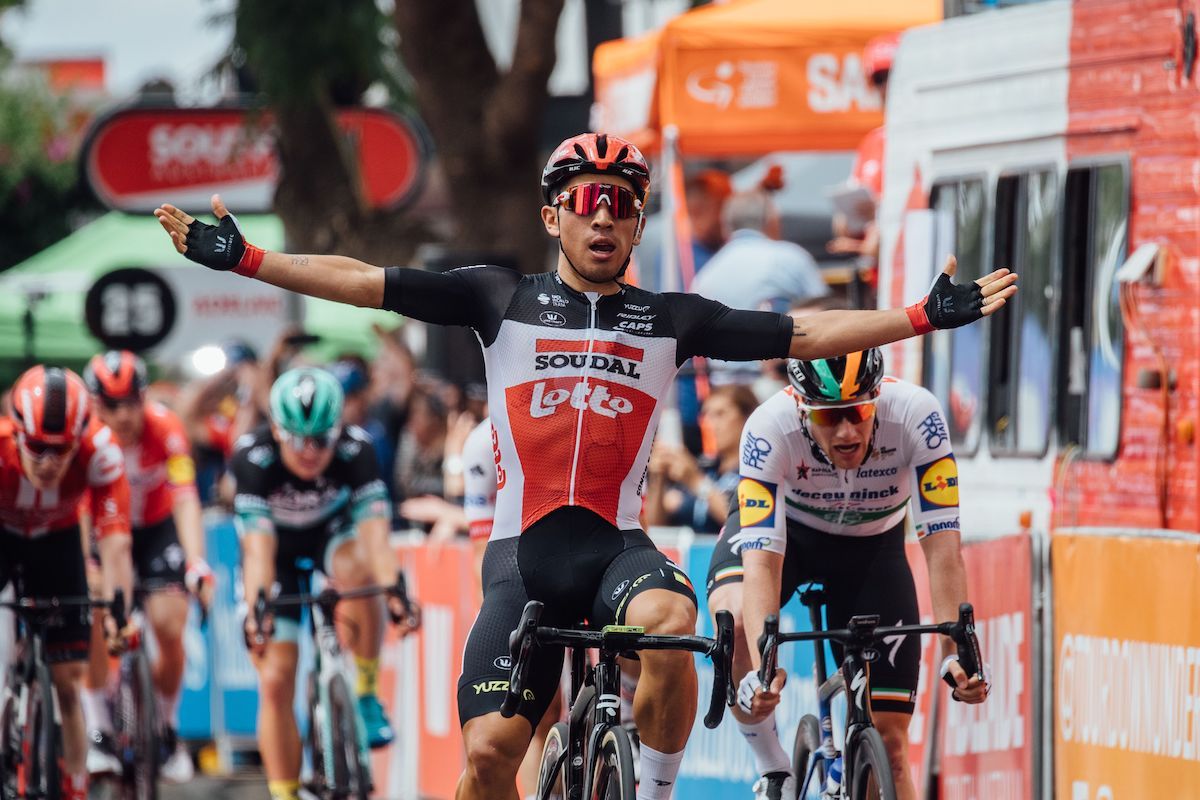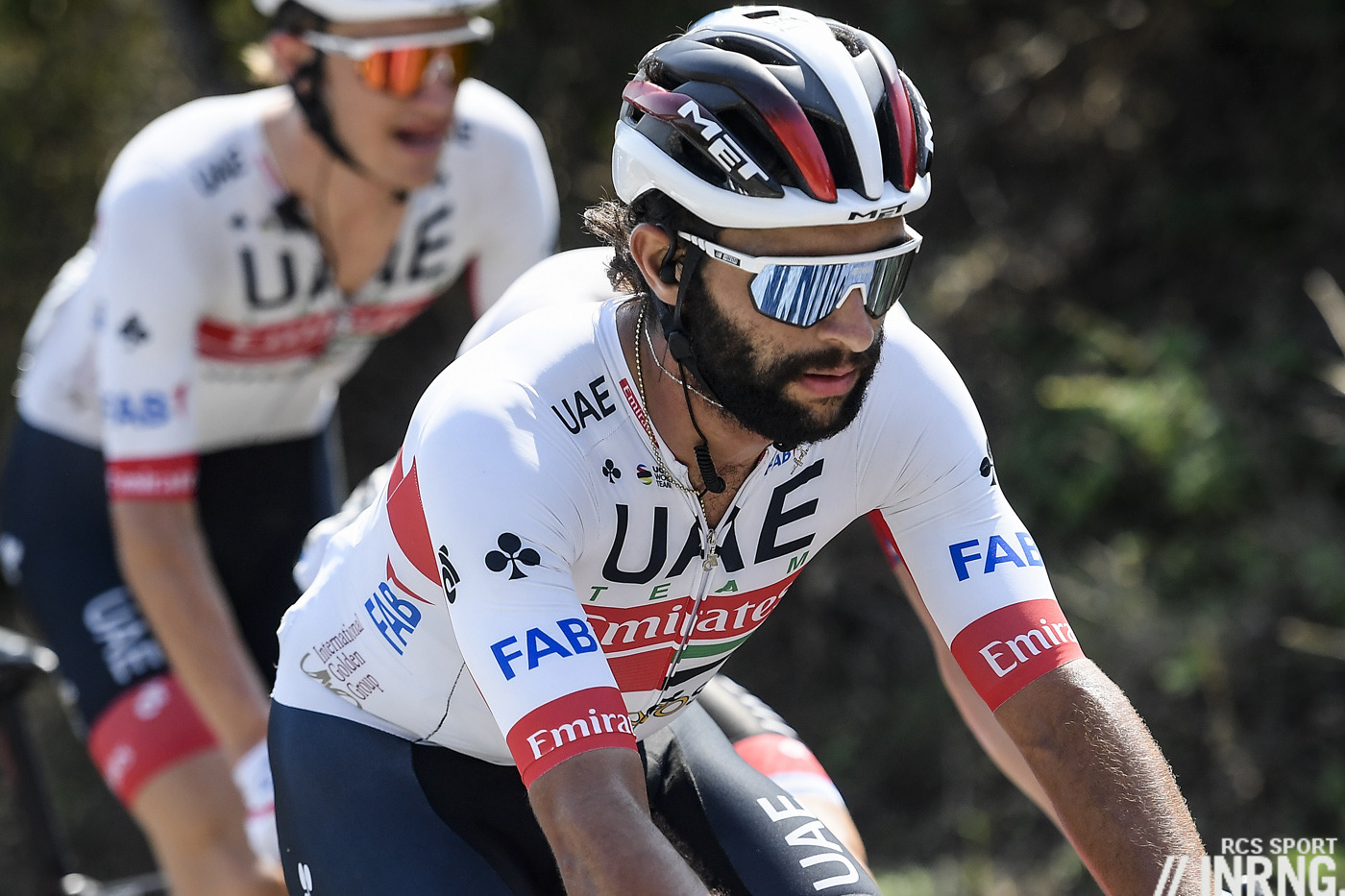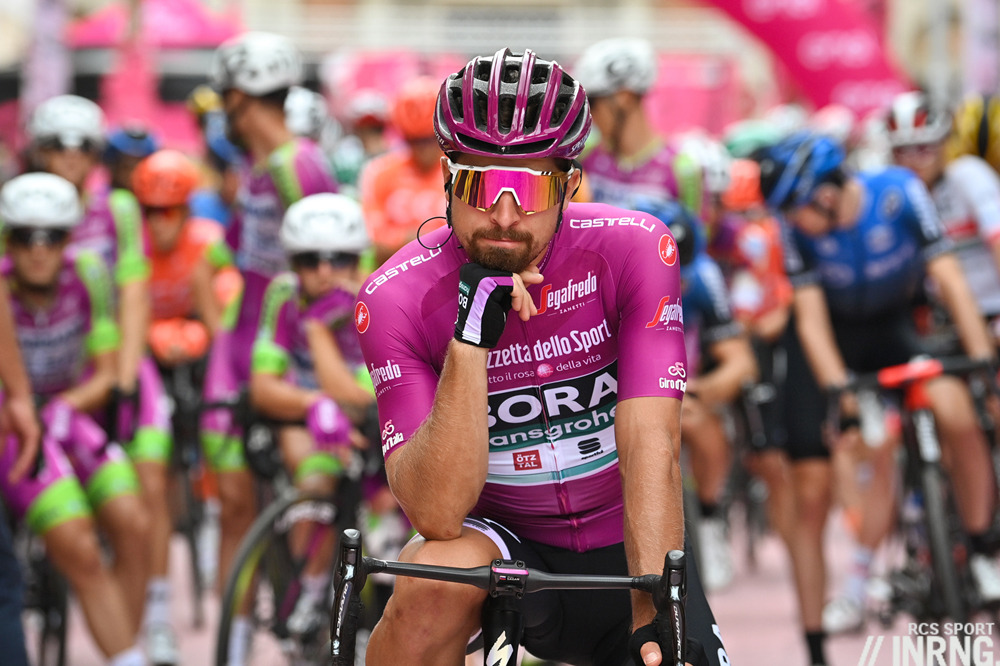A closer look at the points competition and the sprinters in the Giro d’Italia.
Set piece sprints are rare in the Giro, there are just five or six this year. In fact they’re getting more scarce across all the grand tours, a subject to explore more another day. In the meantime here’s a closer look at the points competition and the contenders for the month ahead…

It’s all about the arithmetic
There are two intermediate sprints a day in the Giro, depicted by the purple “S” on the stage profiles. For the points competition riders score points at both of the intermediate sprints and at the finish line (the first sprint also a separate intermediate sprint competition with 10-6-3-2-1 points but these only count for the intermediate sprint contest which has its own daily award on the podium, the second intermediate sprints also offer 3-2-1 second time bonuses ). The allocation of points depends on the stage in question, they are categorised with the typical sprint stages offering more points in a bid to place the purple maglia ciclamino on the shoulders of a sprinter.
- Stages 2,5,7,10,13,18 offer points for the first 15 riders at the finish: 50-35-25-18-14-12-10-8-7-6-5-4-3-2-1. For the intermediate sprint there are points for the first eight: 20-12-8-6-4-3-2-1
- Stages 3,4,6,8,12,15 offer points for the first 10: 25-18-12-8-6-5-4-3-2-1. For the intermediate sprint there are points for the first five: 10-6-3-2-1
- Stages 1,9,11,14,16,17,19,20,21 offer points for the first 10: 15-12-9-7-6-5-4-3-2-1 and for the the intermediate sprint there are points for the first eight: 12-8-6-5-4-3-2-1
The scale rewards the sprinters with the flat stages offering more points, to more riders. There are two strategies to winning the points competition: one to monopolise the bunch sprint stages à la Démare 2020; the other is to perhaps win a sprint stage and place often, then score on the days when other sprinters cannot, this has been Peter Sagan’s method to the green jersey in the Tour de France. A rider has to finish the race too, obvious but the Giro regularly sees the sprinters bail before the Alps, but for the points competition we tend to see those in contention stay because of the prize on offer.
Peter Sagan (Bora-Hansgrohe) had an excellent Tour de Romandie, a stage win and also the kind of form that saw him get over climbs when the sprinters were dropped. He rode the Giro for the first time last year but the points competition eluded him thanks to Arnaud Démare’s dominance, here he can hope to add a first maglia ciclamino win to his collection and Maciej Bodnar and Daniel Oss bring experience and horsepower. With craft and a bit of luck he could win a bunch sprint but can score on days when others might not, look to see if he goes in breakaways on mountain stages to score points at the intermediate sprints. Despite a stage win in Romandie on a very hilly day Sonny Colbrelli isn’t riding so this gives Sagan more chances still.

Is Caleb Ewan (Lotto-Soudal) the world’s best sprinter? Some will cite Sam Bennett but Ewan’s as good if not better, his handicap is a team that can’t offer the leadout Bennett enjoys. Here Ewan gets support from Jasper de Buyst and Roger Kluge but a sprinter of his calibre might want more backing. Ewan might be a pure sprinter but remember the Cipressa this March? He’s got a chance of floating over some of the hills early in the race, but if he can win once or twice we’ll see where he is in the points standings and if he’s out of the mix he may opt out of floating over the Alps.
Alpecin-Fenix aren’t in the World Tour but on several measures they’re superior to some of the WorldTeams and it’s not just Mathieu van der Poel, one of them is win rate of Tim Merlier. The Belgian isn’t a superstar but quietly poaches sprint wins with his fast finish but can he do it in a grand tour? He’s won a stage of Tirreno-Adriatico before but this is his first grand tour. One stage win would do very nicely.
Elia Viviani (Cofidis) is back to winning ways, of sorts. A win in the GP Cholet means he’s at least won something for Cofidis but it’s a meagre score for someone signed on a big contract although both sides knew he would target the Olympics last year Tokyo’s a big goal this season too. Still this is his home race and he comes with his Italian lead out train with his brother Attilio, Fabio Sabatini, and also Simone Consonni who is handy for some uphill finishes.

The UAE squad are seen as one of the big ones in the World Tour but Tadej Pogačar does the heavy lifting for them, without him the squad hasn’t got such depth compared to rival outfits. Fernando Gaviria (UAE Emirates) used to be the hottest thing in sprinting but since moving teams his win rate dropped and that was before he got Covid-19 twice last year too. But the team believe in him and supply him with a big leadout train so we’ll see if he can find winning ways again and one stage would be ideal and he might be encouraged to race on to the end given the team may not be bothered about bringing a sprinter to the Tour de France and if they are then Alexander Kristoff can stake his claim too.
Dylan Groenewegen returns after his long ban. He will test of all of his skills of timing, balance, precision and handling… just to face parts of the media who are going to be asking him how he feels a lot so he can emote live on TV (what really ought to count is the private discussions he’s had with Fabio Jakobsen and that’s none of our business). But it’s the return to peloton that’s probably more interesting and meaningful, just how will he cope with a hectic sprint? He’s been one of the best sprinters in the world – exclude the BinckBank Tour and he’s won stages in every stage race he’s started for a two year spell between 2017 and his Katowice crash – and won’t be starting here just to dip a toe in the water. He’s a pure sprinter though and will struggle with any climbs so the points competition is harder. David Dekker also joins and is a promising sprinter and perhaps more as well for the classics to come.
The field tails off and comes a long list of others who can feature in the top-10 but it’d be an upset if the beat all the names above to win a stage. Giacomo Nizzolo (Qhubeka-Assos) is a versatile sprinter who won the European title thanks to this range, it’s the pure speed that’s his challenge for a stage win but he’s won the points competition twice without winning a stage. Matteo Moschetti (Trek-Segafredo) can place but the wins don’t come often although the Giro is his big goal. The Israel team have several sprinters on the books but bring Davide Cimolai who is more of a leadout specialist. Intermarché-Wanty-Gobert can crowd the top-10 with riders like Andrea Pasqualon and Riccardo Minali while not cracking the top-5, the same for Eolo-Kometa with Vincenzo Albanese and veterans Manuel Belletti and Francisco Gavazzi.
Can a non-sprinter win the points competition? You might remember Michele Scarponi and Joaquim Rodriguez winning a decade ago but o tempora, o mores as those times had a points scale with the same score on offer every day regardless of the stage type. Since the competition was changed to offer more points to the sprinters it’s been their preserve and nobody’s got close.
Finally a tactical question: which teams chase and which riders sit on the front all day to bring a breakaway back? Bora-Hansgrohe and Jumbo-Visma might want to save energy to support their GC goals, Lotto-Soudal might save their riders for breakaways, UAE too. Cofidis haven’t brought a big “tractor”. Alpecin-Fenix don’t have to. This could lead to a stand off at times.


How many watts does Gaviria’s beard cost him. Worth it given its thick magnificence.
Maybe his beard improves the aerodynamics like the dimples on a golf ball.
As i recall, hair is actually quite aerodynamic.
Just ask Tom Boonen!
Specialised did the wind tunnel test. With beard and without. Really.
https://m.youtube.com/watch?time_continue=103&v=FkmCLOjk2h8
I wonder how much Bennett’s GC aspirations will be supported when Jumbo-Visma also have Groenewegen, and even Dekker, to look after in the sprint stages, or is Groenewegen just there to get some racing miles in with less media attention than closer to home. If so the sprint field hardly looks more exciting than Philipsen fighting it out with old timers Greipel and Cavendish in Turkey.
Oh, Philipsen’s fight with old timers were very exciting.
I think Groenewegen’s there for some big racing, if they wanted to give him an easy start away from the limelight he’d do the Tour de Hongrie as planned or Algarve rather than a grand tour, even if the media is still behind barriers these days. Bennett’s still got some decent support and interested to see Foss too but a GC result is on him, no armchair riding.
Remember reading somewhere JV did want to start Groenewegen on smaller races. But given a pandemic year, a grand tour is less prone to be cancelled.
Interesting, thanks.
Nizzolo looked the fastest finisher at Gent-Wevelgem, possibly only losing because of his awful positioning – he started way back, dead last – so I’m tipping him to break his Giro stage duck.
Can’t see past Sagan for the points as I think Ewan will go home early.
Agree on Ewan leaving the Giro early.
Apparently he’s after stage wins in all 3 Grand Tours this year, as well as the Green Jersey in TdF, so I don’t see him going the distance in this one.
Seems odd that DQS are going into to a GT without a sprint option, probably doesnt say much for Alvaro Hodeg. Difficult to see past Peter Sagan for the points jersey, especially as he will be motivated to try to add value to his next contract wherever that might be. I wonder how many genuine sprinters will make it to Milan, it is pretty slim pickings for them after the stage into Verona.
For once DQS are going in a grand tour with real GC ambitions, something they’ve never done for a very long time, Enric Mas in the 2019 Vuelta was perhaps more of a surprise? There’s a lot to think about for the team here, backing a GC leader for the long term is very different to the opportunist stage hunter racing we’re more used to from them in the Giro. It’ll be interesting to see how they manage this.
There is a trend for the sprinters to bail in the Giro. André Greipel in his pomp even left while wearing the points jersey and was very honest about it when we could have got a face-saving story for everyone. But normally you’d expect a sprinter still in contention here to stay on.
Quickstep is going to win the Giro, and im 99% sure they will. Just not sure which rider it will be.
I just hope they’re not risking Evenepoel’s long-term health, etc. Seems weird to come back and start a grand tour.
Yes, you just have to hope that they know what they are doing. It seems very risky after such a long-term injury.
Wait! I thought they were putting the kid in there for the experience of a Grand Tour rather than any sort of tilt at a victory. Have I missed something? The latest issue of Bicisport that I just picked up today makes it sound like Levefere isn’t putting ANY pressure on a guy he’s got under contract until at least the end of 2026.
Well, the media – and thus the public – are talking him up a great deal. Many have him down as 3rd favourite after Bernal and Yates, e.g. Cyclingtips – including the bookmakers (in the UK). Personally, I think that’s unlikely, and I think he’ll do very well to finish, but maybe they know something I don’t (I certainly don’t know anything about being an athlete recovering from an injury). Would seem more sensible for the team to talk about him as if he’s only going for stages – would take some pressure off, at least .
As for those odds, Evenepoel being 4-1, while Hindley is 33-1, Almeida 20-1, Carthy 16-1 is ludicrous – but bookmakers set odds on how people are betting, so that shows how much hype there is.
Incidentally, everyone bar Evenepoel , Bernal and Yates is 15-1 or over. Dan Martin seems worth an each-way bet at 80-1; Ciccone and Masnada are 100-1.
“Well, the media – and thus the public..” OK, thanks. Explains everything 🙂
Will it be with the rider linked to the team in a very long term investment who shares the same nationality as the team and its management and sponsors, or the one reported to have signed elsewhere already for next year? 😉 Now you can have all sorts of scenarios, even a Roche vs Visentini replay, but if the team could chose we surely know who they’d pick.
I can’t think of another sport where this kind of situation exists; where the individual gets such a large share of the glory that a team may not be particularly interested in giving full support to a departing rider. In other sports it’s the team that is remembered for the win, and if a departing athlete becomes a bigger start the team can trade them or sell them to make the team stronger. Of course if a team isn’t winning much, they’ll want to get every win they can, but they still have a huge incentive to showcase riders with longer term contracts.
DQS is a little unusual in that they get almost the lion’s share of credit for their rider’s success, but in this case they have definitely tied a major portion of their future identity to Evenepoel, and so this “game within the game” will be interesting to follow.
Basketball? Michael Jordan and Lebron James, in particular, seem to have transcended their teams.
You could argue the same about Ronaldo and (perhaps) Messi too.
The NBA is a good example of ways it’s different. Cleveland still cherishes and celebrates their championship, even though LeBron is long gone. People still buy clothing with the Chicago Bulls logo on it, even though Jordan retired long ago and ended his career with another team. I’m not saying that other sports don’t have superstars who are celebrated regardless of the team they play for, but cycling is different. Partly it’s down to the lack of team identity continuity (DQS is a relative exception here). Hard-core cycling fans might know what teams Coppi and Merckx rode for, but the overwhelming majority of their glory accrues to them as individuals. But Jordan’s greatness is inextricably tied to the Bulls, just as LeBron’s is to Cleveland, Miami, and Los Angeles.
Formula One is the same. Nobody really worries about the manufacturer’s championship (at least they have one). And the same situation has appeared there, where a departing driver suddenly loses support.
(Quickstep is going to win the Giro, and im 99% sure they will. Just not sure which rider it will be.)
… and when. 🙂
Nice one.
How to tell an internet blowhard from a bookmaker: “Quickstep is going to win the Giro, and im 99% sure they will.”
Further thought on the DQS thing. As Inrng noted in the last paragraph, without them who chases the break on flat stages? The basic setup for any GT stage with any reasonable chance of a sprint finish is for a break to go policed by DQS & the leading team. After say 80km, Tim Declercq etc take up station on the front to start to reel in the break. If things get difficult maybe one or two of the other sprinters teams put one rider up front to help. With DQS clearly not interested in this perhaps we shall see the break with a bigger chance of winning which will rather change the tactical setup of the race. It could well be a chance for a rider from one of the weaker / wild card teams to make a name for himself.
Isn’t Lotto Soudal here almost exclusively for Ewan? If De Gendt isn’t in the break, they have a substantial incentive to keep the break on a leash. For stages that suit Merlier, Alpicen-Fenix seem to have an incentive if they aren’t in the break. Sagan doesn’t need a leadout, so Oss and Bodnar should be on break-chasing duty at least some of the time. Qhebeka and Cofidis have their best shots in sprints, so also have some chasing incentive.
The lack of a DQS sprinter does add a wrinkle that makes the chase for the cyclamen jersey intriguing and unpredictable. I could see Sagan and/or Nizzolo trying to infiltrate a break on some of the lumpy stages where the pure sprinters have less interest, for example.
Lotto-Soudal have De Gendt, Goosens, Oldani and Marczyński for hilly breakaways, plus Harm Vanhoucke has a the makings of GC rider.
Fair enough, but I still think they’ll be riding for Ewan at least in the flatter sprint stages (I know, I know, that’s two stages).
Declerq is the most famous proponent of the all day chase but Iljo Keisse does more or less the same job. I’d expect to see him on the front a lot, keeping things in check for Evenepoel/Almeida/Masnada.
I can’t help but see the cloud of COVID hanging over this points competition, and I don’t mean just the risk of riders and teams being abruptly sent home. Sagan was sick enough from COVID early this year that he lost a month of training early this year. Gaviria has been infected twice. I haven’t seen either of these riders talking publicly about long-term effects, but we have lots of reports of elite athletes from basketball, football, and baseball detailing lingering fatigue, decreased strength, and just generally not feeling themselves. COVID particularly seems to affect recovery, which will especially matter in a grand tour.
Gaviria was indeed not as dominating after he left DQS, but in 2018 he won 9 races (5 WT) with DQS while in 2019 with UAE he won 6 races (4 WT), plus 3 stages at the Vuelta a San Juan in 2020 before his first COVID infection. The rest of his 2020 was less impressive than his 2019, and in his first races (this year) since his second infection at last year’s Giro he’s look like a shadow of his former self.
After winning stage 1 of the Tour de Romandie, Sagan seemed to give himself a break in stage 2, and pulled the plug at the base of the final (stage 1) climb even though he was climbing well the day before. At the time I thought this was a sign he was marshalling his strength for the next day, which was a similar stage to stage 1 (lumpy, but no big sustained climb), where he was able to take third. Cobrelli handled that stage 2 climb fine. I could well be reading too much into this, but I don’t think Sagan is quite 100%, and I wouldn’t be surprised to see him picking his spots for maximal efforts. I think his will to win this jersey will be enough to pull him through to the end, but I think it’ll be close with a spry-looking Nizzolo.